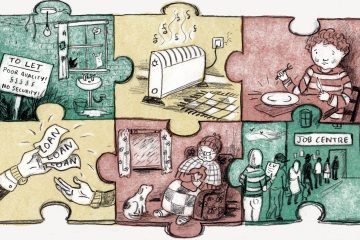On 12th December 2018 a workshop ‘Care after austerity: What next?’ took place at the University of Oxford to conclude Jennie Middleton’s Wellcome Trust funded project on care and austerity in terms of new parents in Oxford. Life on the Breadline Research Fellow, Stephanie Denning, attended the workshop.
The workshop began with a presentation by Jennie Middleton and Farhan Samanani on their Wellcome Trust care, parenting, and austerity research. The research focussed on experiences of new parents in Oxford in the context of the closure of the majority of children’s centres and support in the last decade of austerity. They worked with sixteen new parents and used interviews, parents’ diaries, and participant observation to engage with parents’ experiences. Their project findings are in six themes:
- Feeding and sleeping – these are imposed needs that affect mobility.
- Changing relationships with baby and husband/wife/partner.
- Im/mobility is changed by the baby and its dependence.
- Uncertainty in parenthood e.g. changes in routines.
- Control – lack of control over the baby’s behaviour.
- Access to support – anxiety of being a Mother, loss of identity, comparing self to others. Support means different things to different people.
Overall, the project found that there are entanglements of care and yet in austerity the nature of care is often fragmentary and targeted to need rather than being universal provision. Such fragmentary care from the state is at odds with the entanglement of parental care.
Reflections on the presentation during the workshop raised the interesting question: can you miss something that you did not know existed? As many of the parents in the project were first time parents, they had not raised children in the period before austerity cuts. Beth Knighton, Director of Donnington Doorstep, reflected that some parents come to the Donnington Dootstep centre now and are impressed that it is open two days/week, whilst when cuts were made there was anger in the local community that provision was being cut from six days/week.
The first panel discussion at the workshop focussed on care and the everyday. Amongst others, Sophie Bowlby spoke about the idea of caringscapes – how and why individuals develop and change care practices through time and space – and carescapes – care in terms of services. She argued that caringscapes and carescapes together make up a complex care ecology. Linking everyday care to austerity, Jane Joyce from Oxforshire Breastfeeding Support shared that a service-user had said “austerity has stolen a whole slew of opportunities” as funding has been cut for services.
The second panel discussion focussed on austerity politics. Again amongst others, Eleanor Jupp spoke about how austerity politics have moved from an overt political discourse to an increasingly hidden set of experiences. She challenged us to whether we can imagine a more radical politics of care that makes the invisible visible. In light of government announcements that ‘austerity is ending’ this raises questions over whether austerity is in fact ending, and what the future could hold – the panel felt there were no signs that austerity is ending, and that change is needed.
The workshop closed with reflections from Steve Brown who drew together key themes from the day: matters of care; ecology and the interdependence of care; lived experiences as a starting point; exhaustion; and gendered austerity. Thank you to Jennie Middleton for organising the day, and we look forward to discussions continuing in future research.


